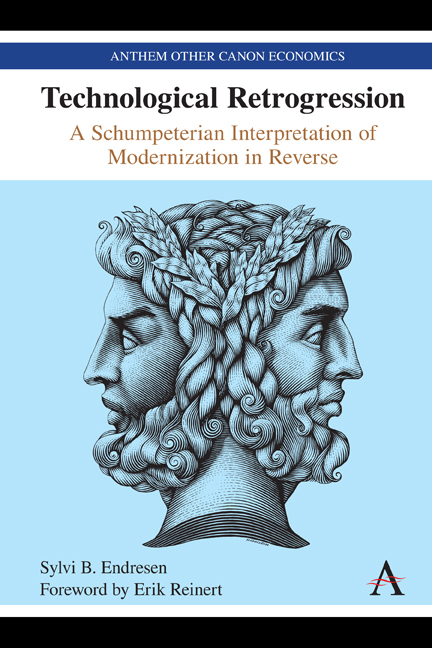Book contents
- Frontmatter
- Dedication
- Contents
- List of Figures
- Foreword
- Acknowledgements
- Preface: The Book within This Book
- Introduction: The Concept of Technological Retrogression
- 1 Challenging Linearity and Irreversibility
- 2 Perspectives on Technological Heterogeneity
- 3 Production Systems and Work Histories
- 4 Empirical Evidence of Technological Retrogression: The Sri Lankan Case
- 5 Empirical Evidence of Technological Retrogression: The Malaysian Case
- 6 A Theory of Technological Retrogression
- References
- Index
Preface: The Book within This Book
Published online by Cambridge University Press: 17 June 2021
- Frontmatter
- Dedication
- Contents
- List of Figures
- Foreword
- Acknowledgements
- Preface: The Book within This Book
- Introduction: The Concept of Technological Retrogression
- 1 Challenging Linearity and Irreversibility
- 2 Perspectives on Technological Heterogeneity
- 3 Production Systems and Work Histories
- 4 Empirical Evidence of Technological Retrogression: The Sri Lankan Case
- 5 Empirical Evidence of Technological Retrogression: The Malaysian Case
- 6 A Theory of Technological Retrogression
- References
- Index
Summary
The major purpose of this book is to formulate a theory of technological retrogression. To do so, I make use of the experiences of the fisherfolk of Malaysia and Sri Lanka during the historical periods when fisheries were modernized. The research was undertaken for the purpose of my PhD dissertation (1995). The theory of technological retrogression is thus constructed from ‘scratch’: primary data at micro level, collected during long fieldworks. To explain the puzzling fact that some fishermen turned their back to modern technology, the standard explanation of technological change had to be reconstructed. This demanded a new empirical approach – the work history method; a sample of fishermen's technological choices over time were noted, as were their justifications for the choices.
The reconstruction of technological change at individual and village levels uncovered technological retrogression, producers’ choice of technologies which lower labour productivity. The fieldworks undertaken and minutely described, I turned to the task of explaining the findings. It brought me on a seemingly endless journey to find ‘The Book’ where the phenomenon of technological retrogression was spelled out. To make a long story short, in the end I had to overcome my inbuilt reverence for theory and theorists and accept that I had to formulate my own. Still, today, ‘technological retrogression’ is an under- researched concept, finding only 1,460 Google hits. A more generic concept, ‘primitivization’, gets 24,000 hits.
I identified technological retrogression in two Third World capitalist countries, late in the twentieth century. To explain the phenomenon, I analysed how major theorists at the time (and times bygone) would have explained the phenomenon of technological retrogression if they had recognized the process. I was looking for their understanding of the confusing state of technological heterogeneity, the period where old meets new. What could be learned from modernization theorists’ teleological belief in an end state of modern bliss? And from neo- Marxists’ and dependency theorists’ quarrelsome efforts at understanding the nature of capitalism in the Third World? In a sense, I ‘extrapolated’ these theories. I came up with the production system approach, bridging the gap between grand theory and the empirical level. The experiences of the fisherfolk could thus be linked to general socio- economic phenomena and to Marx's idea of different modes of production.
- Type
- Chapter
- Information
- Technological RetrogressionA Schumpeterian Interpretation of Modernization in Reverse, pp. xvii - xxiiPublisher: Anthem PressPrint publication year: 2021



